The best boss you’ll ever have in life is yourself. This belief is shared among entrepreneurs and entrepreneurship students alike. It’s also shared by renowned educator, entrepreneur, and author, Ted Coiné.
As a champion for entrepreneurship, Coiné knows what it takes to turn business dreams into reality. And in Collier County Public Schools (CCPS) in Florida, his expertise is helping CTE students at Lorenzo Walker Technical College find success beyond school.
What is CTE in school today?
Career and Technical Education (CTE) refers to a set of career-focused classes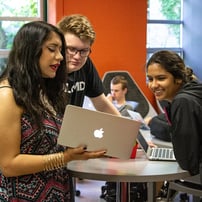 that help students build marketable and transferable skills to take with them beyond the classroom and into real life. All students need both hard and soft skills to succeed in the 'future of work.' Entrepreneurship education can be a powerful component in any CTE program to help students develop these soft or ‘human skills’.
that help students build marketable and transferable skills to take with them beyond the classroom and into real life. All students need both hard and soft skills to succeed in the 'future of work.' Entrepreneurship education can be a powerful component in any CTE program to help students develop these soft or ‘human skills’.
"The most desirous skills, at least in terms of the future of work, by 2030 will be human skills like mental agility, flexibility, risk propensity, the ability to create value and communicate strong analytical and systems thinking...the best way to do that is entrepreneurship education and training that engages students."
~ Dr. Henry Mack, Chancellor for Career, Technical and Adult Education at the Florida Department of Education
CTE in Collier County, Florida
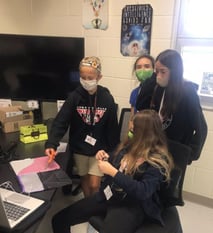 When it comes to CTE and entrepreneurship education in high school, every state and school district is different. The Collier County School District in Florida, for example, is about the same size as the state of Delaware.
When it comes to CTE and entrepreneurship education in high school, every state and school district is different. The Collier County School District in Florida, for example, is about the same size as the state of Delaware.
In a state where commerce is primarily built on three pillars—tourism, construction, and agriculture—workers and students are looking for ways to learn new skills and snag higher-paying jobs. Entrepreneurship is regarded as so critical in building in-demand skills that CCPS offers entrepreneurship at every high school and middle school in the district.
"...these human skills of communication, leadership, teamwork, creativity, initiative...these skills are across the board skills that employers are looking for."
~ Dan McGrew, Vice President of Strategic Policy and Performance for CareerSource Florida
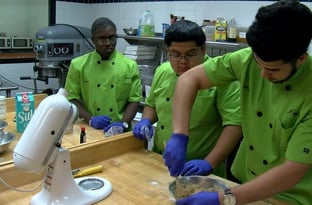 Right now, the state of Florida is encouraging more robust Career and Technical Education (CTE) supported by education policies and funding. As part of this, entrepreneurship is spotlighted as an important curricular option to prepare students for the future of work, regardless of career path. Ted Coiné has seen this firsthand. Ted includes INCubatoredu entrepreneurship in his classes at Lorenzo Walker Technical College (LWTC). Last year, one of Coiné’s student entrepreneurship teams found business success after launching its vegan, Naples-based bakery, Nagen. In a school year that looked much different than expected, LWTC students Carl Veus, Franko Cardozo and Ezekial Ramirez took what they learned from Culinary Arts and entrepreneurship class to solve a real-world business need: tasty treats for those with specialty diets. From a simple business idea, a successful company was born. But running a business isn’t the only thing students learn from entrepreneurship and CTE.
Right now, the state of Florida is encouraging more robust Career and Technical Education (CTE) supported by education policies and funding. As part of this, entrepreneurship is spotlighted as an important curricular option to prepare students for the future of work, regardless of career path. Ted Coiné has seen this firsthand. Ted includes INCubatoredu entrepreneurship in his classes at Lorenzo Walker Technical College (LWTC). Last year, one of Coiné’s student entrepreneurship teams found business success after launching its vegan, Naples-based bakery, Nagen. In a school year that looked much different than expected, LWTC students Carl Veus, Franko Cardozo and Ezekial Ramirez took what they learned from Culinary Arts and entrepreneurship class to solve a real-world business need: tasty treats for those with specialty diets. From a simple business idea, a successful company was born. But running a business isn’t the only thing students learn from entrepreneurship and CTE.
Revamping Career Education
 For over forty years, LWTHC has lived up to its mission of providing rigorous and relevant educational experiences that prepare students with the academic and technical skills they need to succeed in their chosen careers. To continue meeting the needs of the community, LWTC joined forces with local businesses and the workforce and created the District School Board of Collier County Career Planning Task Force. Back in 2004, they began to strategically plan a revamp of the district’s Career Education Program, introducing a Comprehensive Career Education Plan that addresses staff needs, curriculum development, counseling, and mentoring.
For over forty years, LWTHC has lived up to its mission of providing rigorous and relevant educational experiences that prepare students with the academic and technical skills they need to succeed in their chosen careers. To continue meeting the needs of the community, LWTC joined forces with local businesses and the workforce and created the District School Board of Collier County Career Planning Task Force. Back in 2004, they began to strategically plan a revamp of the district’s Career Education Program, introducing a Comprehensive Career Education Plan that addresses staff needs, curriculum development, counseling, and mentoring.
Four years later, the Lorenzo Walker Technical High School opened on campus, giving high school juniors and seniors the unique opportunity to attend certificate training programs. By 2009, a 200,000-square-foot, state-of-the-art facility to house all CTE programs and classes opened its doors, and in 2015, Ted Coiné stepped inside.
Who is Ted Coiné?
 Ted Coiné has 12 years of educator experience and more than 15 in business leadership. Now, he brings the two seemingly separate career paths together to teach entrepreneurship at the Innovation Lab at LWTC.
Ted Coiné has 12 years of educator experience and more than 15 in business leadership. Now, he brings the two seemingly separate career paths together to teach entrepreneurship at the Innovation Lab at LWTC.
Coiné began teaching English as a Second Language at a private language school in Boston in 1997. In 2001, he founded his own school in his living room. In its first month, what would become Coiné Language School, made $20.
He’s been recognized three times by Forbes for his social media influence, and Inc. Magazine twice. He is repeatedly recognized for his customer service, marketing, and 'future of work' expertise. Plus, he’s written extensively about how businesses can benefit from using social media. Long story short: He knows a thing or two about the relationship between entrepreneurship education and business success.
Changing Career Paths
As a successful business leader, Ted Coiné spent most of his pre-teaching career as a consultant—which he says is a type of teaching. “You’re teaching adults—accomplished business leaders—how to conduct business better. It’s just the subject matter that’s different, and the audiences are different.” As a consultant, Coiné wound up with a car crash-induced concussion (don’t worry, he’s OK now).
“I had to kind of just do nothing for almost two months. During that time, I wondered, am I really enjoying myself professionally?” That’s when Coiné realized he could change his career path. “I love teaching so much more than what I was doing.”
Today, Coiné teaches Business Administration & Analysis. “I call it entrepreneurship,” he says. “It requires me to teach a lot of really cool things beyond just entrepreneurship, but you can’t really teach anybody anything beyond entrepreneurship—because entrepreneurship is in all aspects of work.”
“You can’t really teach anybody anything beyond entrepreneurship, because entrepreneurship is in all aspects of work.”
~ Ted Coiné
Real-World Learning in High School
At Lorenzo Walker Technical High School, students save up their elective credits through their freshman and sophomore years so that they can participate in CTE as juniors and seniors. Once they’ve completed their core coursework, they dive into college classes from nursing to auto repair to entrepreneurship … you name it.
“These are high school kids, but we call them college kids. I treat them like adults,” says Coiné. “It’s cool for 16-year-olds because nobody ever treats them like that.”
 This is the crux of what sets Lorenzo Walker Technical High School (and CTE) apart. By giving high school students the opportunity to solve real-world problems by creating real-world businesses, they learn early on what it takes to succeed in life.
This is the crux of what sets Lorenzo Walker Technical High School (and CTE) apart. By giving high school students the opportunity to solve real-world problems by creating real-world businesses, they learn early on what it takes to succeed in life.
“I want to teach people who need the help and who may not otherwise have had the opportunity,” says Coiné.
Acquiring Transferable Skills
All juniors and seniors at LWTC are enrolled in college or CTE courses in some capacity; that’s why they and their parents seek the school out. The opportunity to learn transferable technical skills is one these students do not take lightly.
“In almost all programs at LWTC, students get a career certificate. From my program in particular, they almost always go into an entrepreneurship program in college,” Coiné says. Even if students don’t necessarily want to be entrepreneurs.
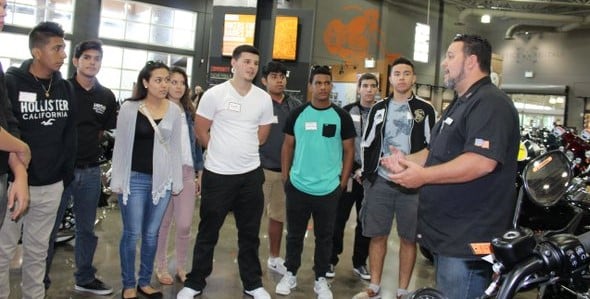
Students and their teachers know that entrepreneurship education helps develop soft skills, too. “I firmly believe that the role of a teacher is to teach children how to teach themselves for the rest of their life, and how to be critical thinkers,” says Coiné. “That’s pretty much what I’m doing through the avenue of entrepreneurship.”
“I firmly believe that the role of a teacher is to teach children how to teach themselves for the rest of their life, and how to be critical thinkers. That’s pretty much what I’m doing through the avenue of entrepreneurship.”
~ Ted Coiné
Entrepreneurship + CTE = Student Success
We already know the benefits that teaching entrepreneurship offers students, but what really helps Coiné’s Innovation Lab class stand out? Behind the awesome educator is a curriculum framework that helps make Coiné’s job a little easier.
“My class is three hours a day, rather than 45 minutes,” says Coiné. “The curriculum and framework Uncharted Learning provides is absolutely essential. It allows me to be creative with the lessons I teach. There’s always material to rely on.”
Another perk to the Uncharted Learning curriculum? The Lean Approach.
The Lean Approach
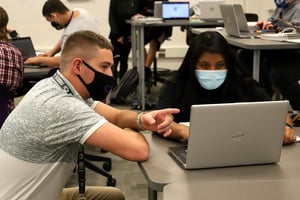 The INCubatoredu class is based on The Lean Startup Approach — a business process that emphasizes the business model over the business plan. It encourages entrepreneurs (or in this case, student entrepreneurs) to keep reiterating until the business solves a real problem, is viable, and is scalable.
The INCubatoredu class is based on The Lean Startup Approach — a business process that emphasizes the business model over the business plan. It encourages entrepreneurs (or in this case, student entrepreneurs) to keep reiterating until the business solves a real problem, is viable, and is scalable.
“The Lean Approach is so much better than what I grew up with,” says Coiné. “The process is build, measure, learn. Students fill out a one-page business plan, then they improve it over time—and they never stop improving it.”
"Just Keep Learning"
“Fail along the way,” Coiné adds. “No one ever wants to fail, but when you do, stick your neck out there. Failure will teach you something each time.” Ted Coiné remembers a time back in 2008 when he started an investment fund. The next month the housing bubble crashed, Lehman Brothers failed, and Coiné closed his new business, too.
“That was an education,” he shares. “When you try something and it doesn’t work out, file it away for next time. It may be useful down the road.” His best advice for budding entrepreneurs and eager high school students is to do something three hours a week. “It doesn’t have to be all or nothing. Just keep learning.”
